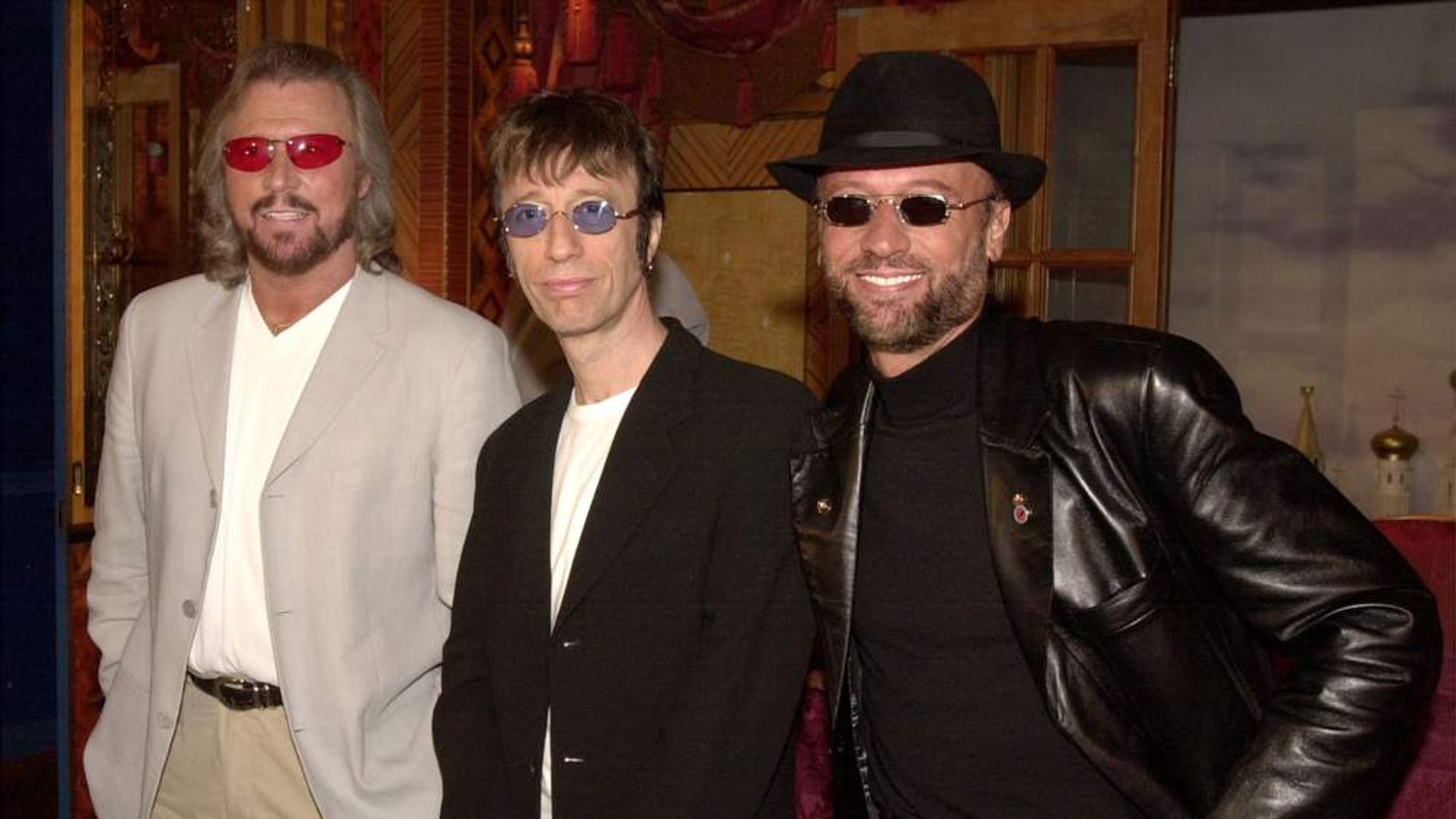The Bee Gees, one of the most iconic music groups of all time, have left an indelible mark on the world of music with their timeless hits and harmonious voices. However, behind the glitz and glamour of their success lies a tragic story that has often been overlooked. The question of which Bee Gees member killed himself and why has intrigued fans and music historians alike. This article aims to shed light on this somber chapter in the band's history, exploring the circumstances surrounding the event and its lasting impact.
The Bee Gees, consisting of brothers Barry, Robin, and Maurice Gibb, rose to fame in the late 1960s and became synonymous with the disco era of the 1970s. Their music transcended generations, and their influence can still be felt today. However, the group's journey was not without its share of personal struggles and heartbreaks. One such tragedy was the untimely death of one of the members, which left fans devastated and raised questions about the pressures of fame and mental health.
In this article, we will delve into the life and death of the Bee Gees member who took his own life, exploring the factors that may have contributed to this heartbreaking decision. We will also examine the broader implications of mental health in the music industry and how this tragedy has influenced discussions around mental well-being. By the end of this article, you will have a comprehensive understanding of the events leading up to this tragedy and its lasting impact on the Bee Gees and their fans.
Read also:Discover The Best Galveston Hotels On The Beach For Your Next Coastal Getaway
Table of Contents
- Biography of the Bee Gees
- The Tragic Event: Which Bee Gees Member Killed Himself?
- Why Did He Do It? Exploring the Reasons
- Mental Health in the Music Industry
- Impact on the Bee Gees
- Legacy and Remembrance
- Lessons Learned: Addressing Mental Health
- Statistics and Data on Mental Health in the Arts
- Support Resources for Artists and Fans
- Conclusion: Honoring the Fallen Star
Biography of the Bee Gees
The Bee Gees, an acronym for the Brothers Gibb, were formed in 1958 by Barry, Robin, and Maurice Gibb. Hailing from the Isle of Man and later relocating to Australia, the trio quickly gained recognition for their distinctive vocal harmonies and songwriting prowess. Their rise to fame began in the 1960s with hits like "Massachusetts" and "To Love Somebody," which showcased their unique blend of pop, rock, and soul influences.
Below is a table summarizing the key details of the Bee Gees members:
| Name | Date of Birth | Date of Death | Role in the Band |
|---|---|---|---|
| Barry Gibb | September 1, 1946 | N/A | Lead Vocals, Guitar |
| Robin Gibb | December 22, 1949 | May 20, 2012 | Lead Vocals, Songwriter |
| Maurice Gibb | December 22, 1949 | January 12, 2003 | Vocals, Bass, Keyboard |
While all three brothers contributed to the band's success, each had a unique role and personality that shaped their music. Barry, the eldest, was known for his powerful falsetto and leadership within the group. Robin, with his emotive voice, often took the lead on ballads, while Maurice provided the harmonic foundation and instrumental versatility.
The Tragic Event: Which Bee Gees Member Killed Himself?
The Bee Gees member who took his own life was Robin Gibb. On May 20, 2012, Robin passed away at the age of 62 after a prolonged battle with health issues, including colorectal cancer and a severe intestinal infection. While his death was not a direct result of suicide, there were reports of deep emotional struggles and depression during his final years, which some speculate may have influenced his mental state.
Robin's health issues began in 2010 when he was diagnosed with cancer. Despite undergoing treatment, his condition worsened, and he was hospitalized multiple times. The physical pain and emotional toll of his illness reportedly left him feeling hopeless, and his family revealed that he struggled with depression during this period. While he did not leave a suicide note, his mental health challenges were well-documented by those close to him.
Why Did He Do It? Exploring the Reasons
Robin Gibb's struggles with mental health were multifaceted, stemming from both his physical ailments and the pressures of fame. Below are some possible reasons for his emotional distress:
Read also:Descendants Of The Sun A Comprehensive Guide To The Iconic Kdrama
- Chronic Illness: The pain and fatigue associated with colorectal cancer and subsequent infections likely contributed to his depression.
- Isolation: As his health deteriorated, Robin became increasingly isolated from his family and fans, which may have exacerbated feelings of loneliness.
- Pressure of Fame: Despite the Bee Gees' success, the music industry's demands and public scrutiny can take a toll on mental well-being.
- Loss of Identity: Being unable to perform and create music due to his illness may have led to a loss of purpose and identity.
Mental Health in the Music Industry
The music industry has long been associated with glamour and success, but behind the scenes, many artists grapple with mental health challenges. Studies have shown that musicians are more likely to experience depression, anxiety, and substance abuse compared to the general population. The constant pressure to produce hits, maintain a public image, and deal with the unpredictable nature of fame can lead to significant emotional strain.
Robin Gibb's case highlights the need for greater awareness and support for mental health in the music industry. Many artists, including other members of the Bee Gees, have spoken out about their own struggles, emphasizing the importance of seeking help and reducing the stigma surrounding mental health issues.
Impact on the Bee Gees
Robin's death marked the end of an era for the Bee Gees. With Maurice having passed away in 2003, Barry was left as the sole surviving member of the original trio. The loss of his brothers profoundly affected Barry, who has since spoken about the emotional void left by their absence. In interviews, he has expressed gratitude for the time they spent together and the legacy they created as a band.
The Bee Gees' music continues to resonate with fans worldwide, and Robin's contributions remain an integral part of their story. His distinctive voice and songwriting talent are celebrated in their timeless hits, ensuring that his legacy lives on.
Legacy and Remembrance
Robin Gibb's legacy extends beyond his music. He was a devoted family man and a passionate advocate for various charitable causes, including efforts to support veterans and promote cancer awareness. His passing prompted an outpouring of tributes from fans, fellow musicians, and public figures, all of whom recognized his immense talent and contributions to the arts.
To honor his memory, the Bee Gees' music continues to be celebrated through concerts, documentaries, and retrospectives. Robin's story serves as a reminder of the importance of addressing mental health and providing support to those in need.
Lessons Learned: Addressing Mental Health
Robin Gibb's struggles underscore the critical need for mental health awareness and intervention, particularly in high-pressure industries like music. Here are some key takeaways:
- Early Intervention: Recognizing the signs of mental health issues and seeking help early can prevent crises.
- Support Systems: Building strong support networks, including family, friends, and mental health professionals, is essential.
- Reducing Stigma: Encouraging open conversations about mental health can help break down barriers and promote understanding.
Statistics and Data on Mental Health in the Arts
According to a 2016 study published in the journal *Psychology of Music*, musicians are three times more likely to experience depression compared to the general population. Additionally, a survey by Help Musicians UK found that 71% of musicians have experienced panic attacks or anxiety, while 69% have struggled with depression.
These statistics highlight the urgent need for targeted mental health resources and support systems within the music industry. Organizations like Music Minds Matter and the Recording Academy's Mental Health Initiative are working to address these challenges and provide assistance to artists in need.
Support Resources for Artists and Fans
If you or someone you know is struggling with mental health, there are numerous resources available to provide support:
- Music Minds Matter: A 24/7 helpline offering mental health support for musicians and industry professionals.
- National Suicide Prevention Lifeline: Available at 1-800-273-TALK (8255) in the United States.
- Samaritans: A UK-based organization offering confidential emotional support.
Reaching out for help is a sign of strength, and no one should face their struggles alone.
Conclusion: Honoring the Fallen Star
Robin Gibb's life and legacy are a testament to the power of music and the resilience of the human spirit. While his passing was a profound loss, his contributions to the Bee Gees and the world of music continue to inspire generations. By shedding light on his struggles and advocating for mental health awareness, we can honor his memory and ensure that others receive the support they need.
We invite you to share your thoughts and memories of Robin Gibb in the comments below. If this article resonated with you, consider sharing it with others or exploring more content on mental health and the arts. Together, we can create a world where no one feels alone in their struggles.

